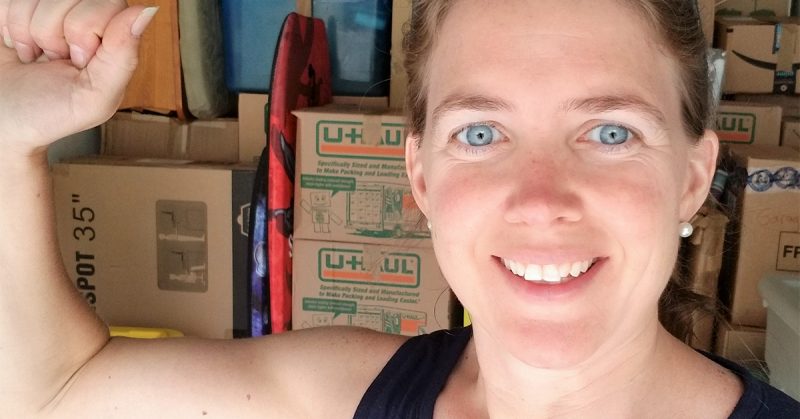How long does it take to get settled at a new duty station? Does it happen when the last box is unpacked, when the pictures are hung, or when you can finally find your way around town without the GPS? The truth is that moving is a long process which often takes military families several months to complete. Moving isn’t just a physical exercise in unpacking and finding a job. It is also an emotional journey for the whole family.
After moving, the service member may have a few days to unpack boxes and set up the house. Then they check into their new assignment and resume familiar routines of military schedules and responsibilities. For the military spouse and kids, however, the moving process may look quite different. They must find new schools, jobs, friends, activities and support systems. Their daily schedules and routines may feel unfamiliar for a while. This can lead to a feeling of “Post-PCS letdown” or depression.
Military families have a lot of baggage to unpack after a PCS move. In addition to the physical boxes that quickly fill up the garage, families must also unpack layers of emotions related to the move. Resolving these issues can take several months. Give your family time to unpack emotionally after a PCS move.
- Spouses and children often miss the friends they had at the last duty station.
- Family members may feel lost or overwhelmed in the new town.
- It’s common to suffer an identity loss after changing jobs, moving schools, or quitting favorite hobbies and activities.
- Some people feel angry at the service member when they are forced to PCS.
- Children may shut down or struggle in school because of different curriculums.
- Spouses may feel resentful to lose their supportive networks or nearby family members.
All these emotions are common after a PCS move. The more a military family is aware of this emotional baggage and willing to discuss it, the faster they will be able to work through the layers of emotion. Gradually, even the most unhappy spouses and children can learn to accept the new location as home.


Ways to help your family adjust after a PCS move:
- Take an orientation class on base. Each branch has a different title for these classes, but most installations offer a free orientation class for newcomers. You don’t need to be a new military spouse to benefit. You can re-take the class at each base to learn details about local resources, where to find things, specific discounts, and general military information. Plus, you can connect with other spouses and make new friends. Check with your base family center for details.
- Ask questions and listen. Each family member will process a PCS move in their own way. Some children may be more outgoing and jump right into new activities. Others will be slower and angrier, needing months before they feel settled. Both responses are normal. The important thing is to keep communication lines open. Check in with your spouse and kids every week to ask how they are feeling about the new location. Discuss highlights and challenges they are facing, then brainstorm solutions together. Try to avoid blaming each other. Instead, focus on getting through the move together, as a team.
- Explore the local area. Every military installation feels strange and foreign at first. As a family, drive around base and through the local town. Check out local restaurants, park or points of interest. Try to make the move an adventure, so family members can see the positive side of their new home. Stop by your base ITT (Information, Tickets, and Tours) office to learn about local attractions and military discounts. Then plan a family fun day from the list of nearby activities.
- Join a club, team or activity. The sooner you get connected to the local community, the sooner your new base will begin to feel like home. The fastest way to meet locals is to participate in regular events. Join a gym, visit churches, search for Facebook pages related to your hobbies, and connect with parents at your child’s new school. If you or your children participated in sports or clubs at your former duty station, then find similar teams in your new area. This will help the whole family feel more settled and less lonely.
- Talk to a counselor. If you are feeling down or depressed after a move, try discussing your struggles with a professional counselor. They can also help if your child is acting out and resentful after a move. Military One Source offers free counseling to military families on a variety of topics. You can talk to a counselor over the phone or by video chat, so you don’t have to leave home. There are relationship counseling tracks designed to improve the bond between a couple or between the parent and child. These are especially helpful for families dealing with a stressful PCS move.
If your family is struggling to adjust after a PCS move, don’t get frustrated with them. Instead, give them time to unpack all their emotions. Moving is a process that often takes several months. Use these tips to grow closer as a family during this stressful time.





